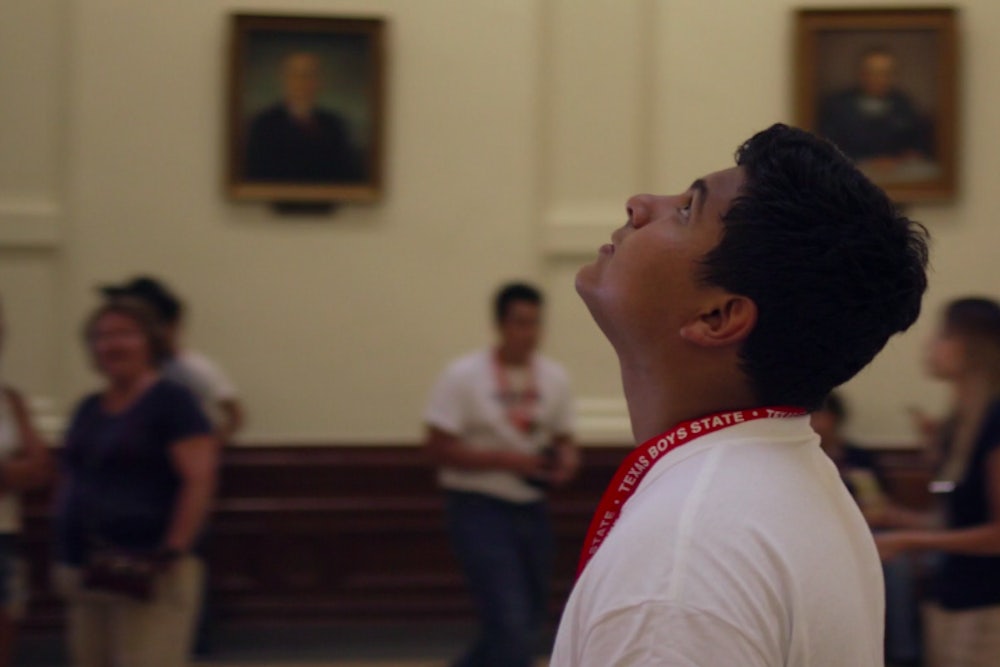A teenage boy fidgets on a couch, his eyes darting around behind curtains of Ashton Kutcher hair. One of the 1,000 young subjects of the documentary Boys State, this boy, Robert, has just given a halting speech to an audience of teenagers in Austin, Texas, about something he doesn’t believe in. He personally supports abortion rights, he explains to the interviewer, but thinks his view isn’t the norm. “So I changed my view,” he says. “That’s politics. I think.”
Learning the definition of politics is what Boys State, a week-long camp for kids interested in government, is all about. Over the course of a week, the kids must construct a state administration from the ground up. Anybody can run for “governor,” the highest “office” available to campers, provided they earn 30 signatures from among their peers. Their ideas can be as mainstream or extreme as they wish; the previous year, for example, the Texan Boys State campers voted to secede from the United States.
Boys State (there’s a Girls State equivalent, too) was founded by the American Legion in 1935 as a red-blooded, capitalist alternative to the Young Pioneer Camps and functions like a gigantic yet parochial version of the Model United Nations. The Boys/Girls State organization has itself become a political institution, boasting famous alumni like Dick Cheney, Rush Limbaugh, Cory Booker, and more.
The documentary, executive produced by Democratic mega-donor Laurene Powell Jobs, is one of a raft of political documentaries to flood the 2020 online streaming market, along with the Obamas’ Netflix titles Becoming and Crip Camp. Spreading electoral messages through popular entertainment seems to be a new liberal frontier in America’s ongoing culture wars. When we watch these boys come together to found society anew, we’re not so much witnessing a straightforward microcosm of democracy in action but a bunch of kids trying to get their heads around the bizarre tangle of controversies that passes for the political conversation these days.
This week is an especially intense time to watch Boys State, as Donald Trump froths at the podium of the Republican National Convention. So many of the campers bear the influence of his campaign style. The majority of the young Texans in attendance begin the movie delivering polarizing speeches about their God-given rights to carry guns and oppose abortion. However, when the campers are split into two parties, the Federalists versus the Nationalists, some surprisingly liberal voices rise to the top.
The first major election is for state chairman. The Nationalists pick the devastatingly sharp René Otero, and the Federalists elect “politics junkie” Ben Feinstein. Otero is Black and grew up in Chicago with a long history of policy advocacy behind him already, and Feinstein is a bilateral amputee. Both boys’ visible difference to the majority of fist-pumping, sports-mad white boys who attend the camp lends them a grit and shrewdness that come from experience.
At the end of the week, the most ambitious campers run for governor of their party before the two nominees battle it out in the general gubernatorial contest. Otero and Feinstein try to recruit charismatic candidates while they plot strategy from behind the scenes. The Nationalists choose Steven Garza, the third son of an immigrant mom from Mexico. He begins each speech quietly, almost diffidently, before crescendoing into thunderous rhetoric on issues like gun control, the truth of the American Dream for immigrants, and the need for party unity in the face of the opposition. Garza radiates honesty and integrity.
In contrast, the Federalists elect Eddy, a smooth-talking white boy who is over-reliant on statistics in his speeches. Watching from the sidelines as his opponents woo the crowd, Feinstein realizes that the Otero-Garza team is going to crush the Federalists if he doesn’t act soon. So Feinstein takes a play straight out of the Trump handbook; literally, he explains, he copied the idea from Trump—and engineers a scandal.
During a debate, Feinstein instructs Eddy to break a minor procedural rule. Otero, who had been assigned to moderate the event, takes the bait and protests the infraction. Feinstein then spends the rest of the election telling everybody he meets that Otero is biased and exploits his power to unfairly bring down Eddy. It works. Eddy wins. Fin.
The parallels with President Trump’s campaign strategy in 2016 and in the upcoming election barely need pointing out. On Monday, for example, Trump said at the Republican National Convention that the Democrats were “using Covid to steal the election,” while continuing to attack the integrity of the mail-in voting system. Ultimately, Feinstein proves Trump’s point that people will flock to a leader who convinces them they’re being conspired against by the opposition. He sacrifices the good name of the Boys State democratic system, in other words, to win power for his side. How can you blame a kid for wanting to be like the most powerful man on earth, even if he’s a liar?
Boys State reaches its climax with Garza sobbing down the telephone to his mother, explaining that he’s not crying because he lost but because everybody keeps hugging him; it turns out that the real gubernatorial race was the friends we made along the way. Coupled with the depressing inevitability of Feinstein’s dirty tactics, which seem to go unchallenged by any adults present, Boys State captures the liberal approach to 2020’s culture wars with damning precision. Garza “wins” the moral contest staged by the film by becoming its martyred hero, but like some kind of adolescent Hillary Clinton impersonator, he loses the actual struggle for power.
Boys State is like watching a slow, sad replay of the 2016 presidential election but with crying children instead of crying adults, and it proposes no solutions to the problems it defines. Even teenagers have got a knack for the cynical anti-politics infesting Capitol Hill these days, however, and for that lesson, Boys State is helpful—if only as a cautionary tale about what extracurriculars not to enroll your kids in.
